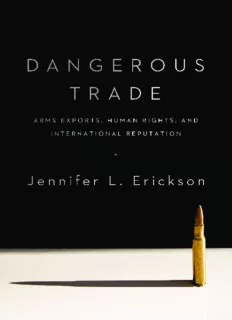
Dangerous trade : arms exports, human rights, and international reputation PDF
Preview Dangerous trade : arms exports, human rights, and international reputation
Dangerous Trade Dangerous Trade Arms Exports, Human Rights, and International Reputation Jennifer L. Erickson C Columbia University Press New York Columbia University Press Publishers Since 1893 New York Chichester, West Sussex cup.columbia.edu Copyright © 2015 Columbia University Press All rights reserved Library of Congress Cataloging-in-Publication Data Erickson, Jennifer L., author. Dangerous trade : arms exports, human rights, and international reputation / Jennifer L. Erickson. pages cm Includes bibliographical references and index. ISBN 978-0-231-17096-3 (cloth : alk. paper)—ISBN 978-0-231-53903-6 (e-book) 1. Arms transfers—Law and legislation 2. Arms control. 3. Export controls. 4. Human rights. I. Title. K3924.M8E75 2015 382'.456234—dc23 2014022403 Columbia University Press books are printed on permanent and durable acid-free paper. This book is printed on paper with recycled content. Printed in the United States of America c 10 9 8 7 6 5 4 3 2 1 COVER DESIGN: FACEOUT STUDIO References to websites (URLs) were accurate at the time of writing. Neither the author nor Columbia University Press is responsible for URLs that may have expired or changed since the manuscript was prepared. To my parents Contents Acknowledgments ix List of Abbreviations xiii 1. Introduction and Overview 1 2. “Responsible” Arms Transfer Policy and the Politics of Social Reputation 16 3. History and Contemporary Trends in Conventional Arms Export Controls 44 4. Explaining Commitment: International Reputation and “Responsible” Arms Transfer Policy 73 5. Explaining Compliance: Domestic Reputation and Arms Trade Scandal 106 6. Conclusions and Implications 139 viii Contents Appendix A. Multilateral Conventional Arms Control in the Twentieth and Twenty-fi rst Centuries 157 Appendix B. Data Sources and Coding 163 Appendix C. Full Statistical Results 173 Notes 179 References 213 Index 257 Acknowledgments It is with deep gratitude and appreciation that I acknowledge the individuals whose support and feedback have made it possible for me to write this book. To my mentors at Cornell University in particular, I still cannot adequately express my thanks for their generosity of time, thorough comments, and steady support. They stretched me intellectually and gave me a research foundation on which I continue to rely. Peter Katzenstein is an unparalleled mentor, scholar, and teacher. I will always be grateful for his wisdom, knowledge, and guidance on “the long road to Ithaka” and beyond. The road has been a long one, and he has been there with me every step of the way. Christopher Way has given patient advice on statistics, invaluable commentary, and supportive conversation. Mat- thew Evangelista’s thoughtful reading pointed me in theoretical and empirical directions that helped to shape the project from its early stages onward. I also thank Jonathan Kirshner for his sharp questions as external reader and his men- torship while I moved the project forward. This fi nal product is incalculably better because of these individuals’ tireless efforts, and I cannot imagine having completed it without them. As I have worked to complete the book, I was fortunate to start out at the Dickey Center for International Understanding at Dartmouth College, where I encountered a wonderful intellectual community among center fellows and the
Description: